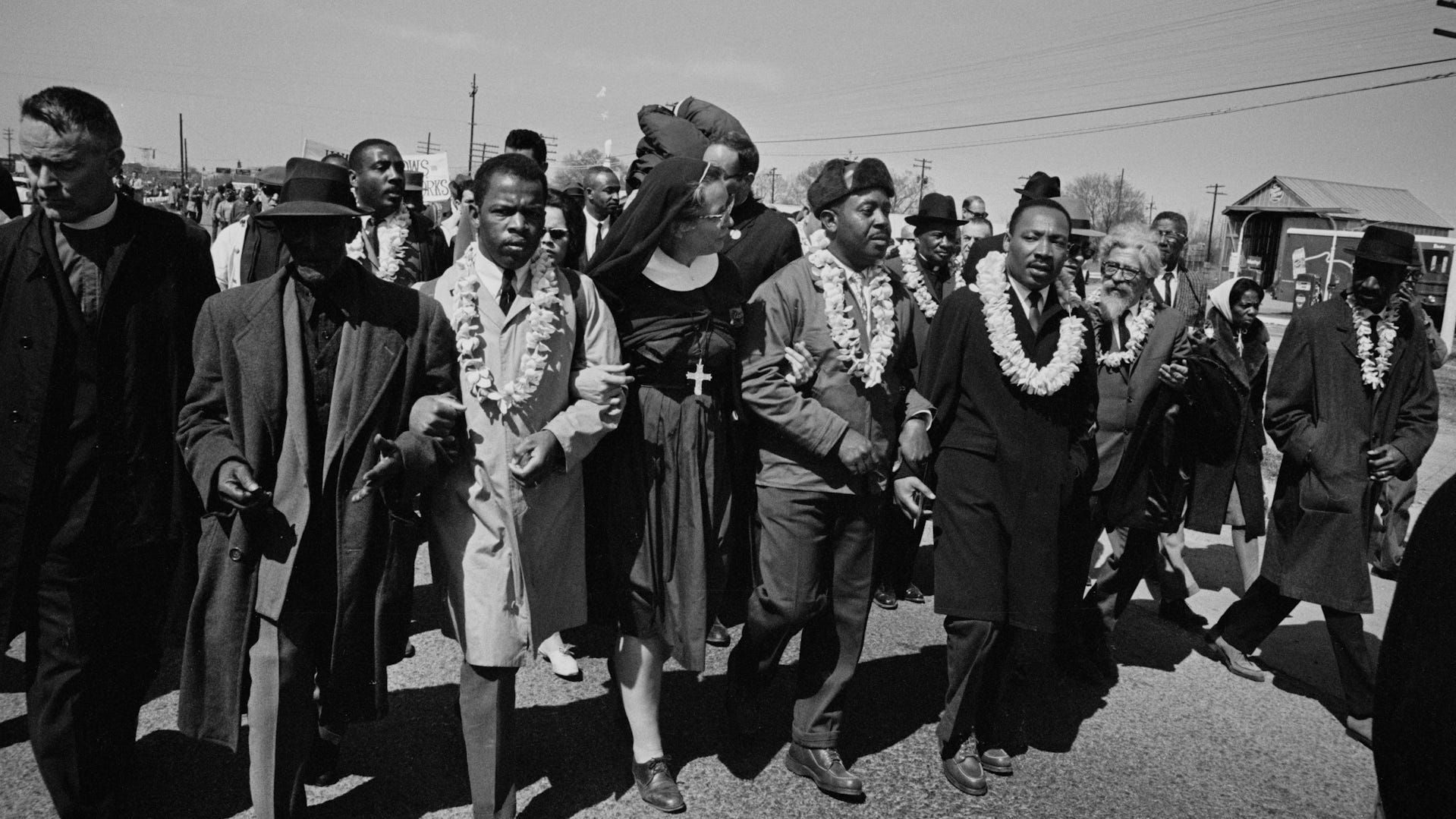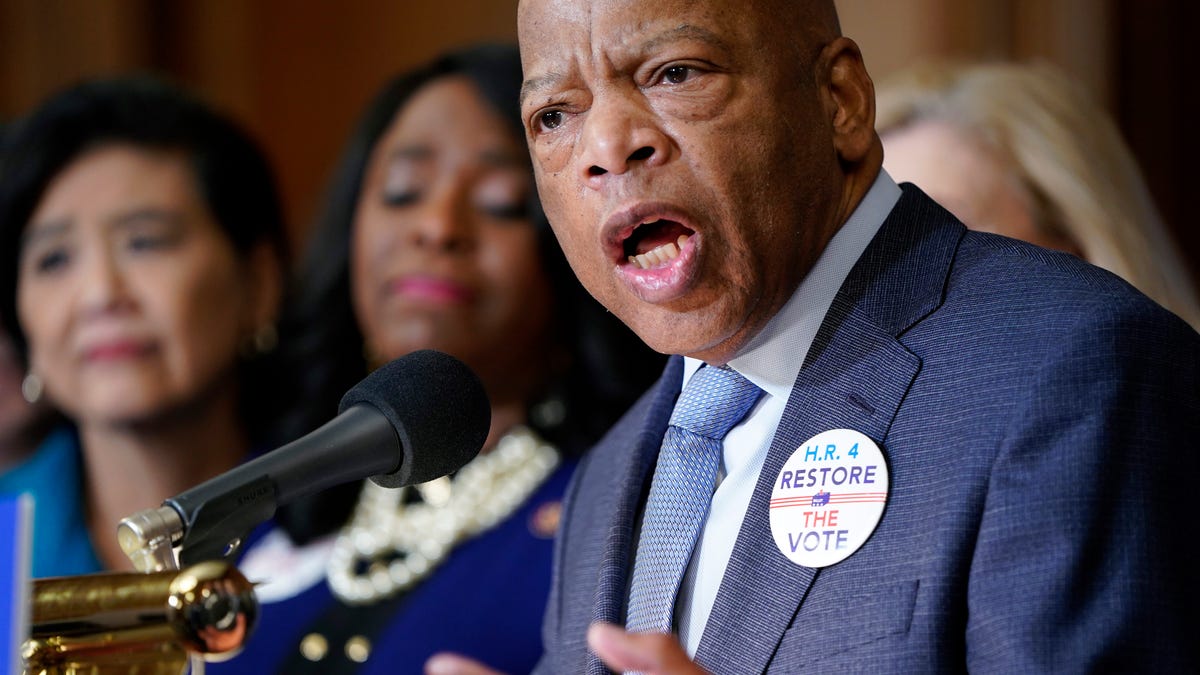
Good Trouble protests honor John Lewis and challenge Trump policies
Over 1,600 Good Trouble protests are expected on July 17 to honor late civil rights icon John Lewis and challenge Trump-era policies.
More than 100 protesters in metro Phoenix gathered on July 17 to honor the late U.S. Rep. John Lewis.
The demonstrations were among the two dozen protests planned across Arizona to honor Lewis, a longtime Democratic lawmaker from Georgia and icon of the civil rights movement who died five years ago.
Organizers expected hundreds of thousands of protesters nationwide to turn out for 1,600 planned “Good Trouble Lives On” events.
In Phoenix, 50 protesters stood outside an ICE field office waving flags from various regions of the world, including Europe and Latin America along with LGBTQ+ Pride flags and anti-ICE flags.
Three Phoenix Police Department detectives stood outside and watched protesters, who cheered as cars honked in support of the protest, alongside Central Avenue.
“We’re all children of immigrants and we can’t forget that,” said Nancy Francque of Phoenix.
There were 30 events planned in Arizona, including a protest at the Arizona Capitol in Phoenix and demonstrations in cities across the state such as Tucson, Sedona and Yuma. A list of area protests is available on the Mobilize website.
“By defending the weakest among us, we defend ourselves,” said Duane Stilwell, a dual citizen who is originally from Mexico City.
In north Scottsdale, some 100 people gathered at the intersection of Northsight Boulevard and Raintree Drive for a peaceful protest, continuing a weekly demonstration that has taken place every Monday since Presidents’ Day.The crowd, many of whom are regulars, held handmade signs and participated in call-and-response chants. The protests are typically aimed at Rep. David Schweikert, R-Arizona, but many turned out on July 17 to honor the legacy of Lewis, a civil rights leader whose legacy continues to inspire.Despite the heat, the mood was upbeat, with smiling faces and a sense of community.Judy Robbins from Phoenix said, “We need to be heard, and we need to be protected. And our civil rights, our human rights, our morals need to be upheld in our highest office.”“He asked people to be in the streets. We’re on the sidewalk. You know, so how brave are we? But there may be a day that comes that we need to be on the street,” Ruth Murphy of Phoenix said.
Lewis died five years ago on July 17, 2020. Civil rights advocates have hosted protests in his honor every year since. This year’s protests are larger than ever, organizers say.
It’s part of a broader trend. Millions of protesters have turned out across the country to demonstrate against President Donald Trump. Just last month, thousands gathered across Arizona for “No Kings” protests on Trump’s birthday.
“We knew this was gonna be much larger this year,” said Robert Weissman, the co-president of the consumer-advocacy and government-watchdog organization Public Citizen. “People are really eager to participate in protests, marches, vigils, teach-ins, even barbecues, to challenge Trump’s authoritarianism. Especially the administration’s clampdown on civil rights.”
Public Citizen is one of many groups organizing the protest, including the League of Women Voters, the Transformative Justice Coalition, the Leadership Conference on Civil and Human Rights and Black Voters Matter.
Lewis served 17 terms in Congress, where he was often called the “moral compass” of the House.
The Georgia Democrat was one of the youngest leaders in the civil rights movement of the 1950s and 1960s. He was an organizer of the 1963 March on Washington, and in 1965 was injured while leading the “Bloody Sunday” march across the Edmund Pettus Bridge in Selma, Alabama.
Lewis coined the phrase “good trouble,” meaning nonviolent action and peaceful protest.
In that spirit, the “Good Trouble” protests were planned to focus on civil rights considerations and civil rights organizations.
According to Weissman, protesters are eager to turn out for a long list of reasons, including the president’s immigration crackdown, the Republican-backed tax bill that makes deep cuts to Medicaid, and the Justice Department “abandoning” its traditional mission and focusing instead on “alleged abuses against the rights of white people.”
The protest is “designed to show mass opposition to Trump’s authoritarianism,” Weissman said, and “create a sense of solidarity and overcome people’s feelings of fear and isolation.”
“Something needs to change,” Evo Terra of Phoenix said.
Stephanie Murray covers national politics and the Trump administration for The Arizona Republic and azcentral.com. Reach her via email at stephanie.murray@gannett.com and on X, Bluesky, TikTok and Threads @stephanie_murr.
